print Print...
(by Matt Quillen, of RNN, posted at WSFA.com Atlanta) – The upcoming presidential election grabs most of the headlines, but the races for U.S. Senate could have an even greater effect on the direction of the federal government.
Heading into Nov. 6, Democrats hold a 51 to 47 margin in the Senate (two senators, Joe Lieberman and Bernie Sanders, are independents [Lieberman is a former long-time Democrat and Sanders is a Socialist]). A total of 33 seats are up for grabs, with 10 “toss up” races that could go either way.
According to polling and analysis, it is unlikely either side will gain the 60 members needed for a Senate supermajority, which would prevent a party-line filibuster. But the majority still gains a significant advantage in promoting its platform.
The side with the greater number chooses the Senate majority leader, who schedules the votes, discussions and other business of the session. He or she also is able to offer motions and amendments before other members.
The ruling party seats a greater number – in a percentage equal to its majority – on Senate committees as well, and it appoints the committee chairs. The committees select bills to be voted on by the full legislature, hold oversight hearings and have confirmation hearings on presidential nominees, including Supreme Court justices.
In the case of a 50-50 Senate split, the vice president would serve as the tiebreaker.
The House of Representatives is expected to stay under Republican control, but there is a chance the president and Senate majority will be from opposing parties. If that happens, either Mitt Romney or Barack Obama would have a partisan roadblock in the way or their plans.
While the president retains the last word on whether to sign a bill or veto it, severe concessions could be needed to turn the campaign promises they made into legislation.
Here are some of the tightest 2012 Senate races (polls available on realclearpolitics.com):
ARIZONA – [Replacing Sen. Jon Kyl (R), who is retiring]: Jeff Flake (R), Richard Carmona (D)
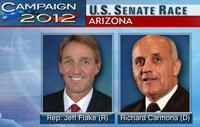 With Kyl retiring, Democrats have the opportunity to take an Arizona seat for the first time since 1995. Flake, a Congressman since 2001, appeared to be the heavy favorite in the typically red [Republican] state, but changing demographics are moving the state closer to the political center.
With Kyl retiring, Democrats have the opportunity to take an Arizona seat for the first time since 1995. Flake, a Congressman since 2001, appeared to be the heavy favorite in the typically red [Republican] state, but changing demographics are moving the state closer to the political center.
Either candidate can point to data in their favor, depending on the poll.
Carmona, the former Surgeon General under President George W. Bush, said his top priority was to rebuild a middle class through job growth. He lists helping homeowners who remain “underwater” on mortgages and investing in new energy technologies as keys to doing so.
Flake argues taxes and regulations need to be more business friendly to promote economic and job growth. “It’s difficult for businesses to grow and expand and create jobs when the federal government is weighing down the private sector with onerous regulations,” Flake states on his campaign site.
CONNECTICUT – [Replacing Sen. Joe Lieberman (I), who is retiring]: Linda McMahon (R), Chris Murphy (D)
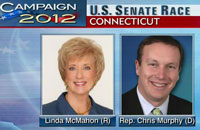 For McMahon, the former WWE CEO and wife of Chairman Vince McMahon, this is the second run at a seat in the upper house, following a 10-point defeat in 2010 to Richard Blumenthal. This time around, her chances look better against Murphy, a six-year Congressman.
For McMahon, the former WWE CEO and wife of Chairman Vince McMahon, this is the second run at a seat in the upper house, following a 10-point defeat in 2010 to Richard Blumenthal. This time around, her chances look better against Murphy, a six-year Congressman.
Polls have shown the two within the margin of error range, although numbers from Quinnipiac University on Wednesday showed Murphy widening his lead to six points. However, McMahon has shown a willingness to dig into her deep pockets; she has personally spent $28 million on the campaign.
Murphy proposes continuing the Bush tax cuts for all but the top 1 percent of income earners. He also wants to change “Buy American” laws to push more federal contracts toward domestic businesses.
McMahon’s economic plans include dropping the middle class tax rate from 25 percent to 15 and dropping the corporate tax rate from 35 percent to 25.
INDIANA – [Replacing Sen. Dick Lugar (R)]: Joe Donnelly (D) and Richard Mourdock (R)
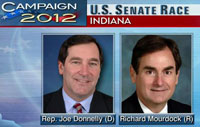 Many assumed Mourdock, a former state treasurer, would be a shoo-in for office once he [beat] incumbent Richard Lugar in the Republican primaries, given the conservative leaning of the state.
Many assumed Mourdock, a former state treasurer, would be a shoo-in for office once he [beat] incumbent Richard Lugar in the Republican primaries, given the conservative leaning of the state.
…The most recent poll (Oct. 10 and 11) from Rasmussen Reports had Mourdock leading by five points. However, the conservative candidate may have given his opponent an opening at their debate Tuesday, with his [answer to a question on abortion]. Mourdock said: “I struggled with it myself for a long time, but I came to realize life is that gift from God. And I think even when life begins in that horrible situation of rape, that it is something that God intended to happen.”
Donnelly, a Congressman since 2006, wants to close tax loopholes for large corporations and help domestic manufacturers by opposing “unfair” international trade. Mourdock states his plans include cutting federal spending by 7.6 trillion in the next 10 years and repealing Obama’s health care bill.
MASSACHUSETTS – Sen. Scott Brown (R) and Elizabeth Warren (D)
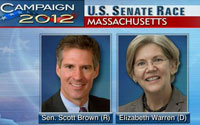 Brown won his seat in a 2010 special election after the death of Sen. Ted Kennedy. His election from the typically blue [Democratic] state ended the Democrats’ supermajority (60 members) in the Senate.
Brown won his seat in a 2010 special election after the death of Sen. Ted Kennedy. His election from the typically blue [Democratic] state ended the Democrats’ supermajority (60 members) in the Senate.
Brown, a former state senator, presents himself as “an independent voice” who does not tow the party line. He listed tax breaks for companies that hire returning veterans as part of his successful jobs agenda.
Challenger Elizabeth Warren served as chair of the Congressional oversight panel for the Troubled Asset Relief Program. She also led the establishment of the Consumer Financial Protection Bureau. [There has been controversy over the fact that Ms. Warren claimed while at Harvard Law School that she was of Native American heritage, a claim that could not be proved.]
Recent polls showed Warren with a slight edge of between 2 and 5 percent.
MISSOURI: Todd Akin (R), Sen. Claire McCaskill (D)
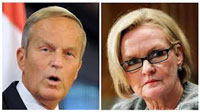 McCaskill looked like she was on her way to being a one-term senator, with Akin leading in polls by as much as 11 points. Then the 12-year Congressman made his infamous “legitimate rape” comment. Since he [made the comments], McCaskill has taken the lead. However, the Democrat’s advantage stands at 8 percent or lower, depending on the poll.
McCaskill looked like she was on her way to being a one-term senator, with Akin leading in polls by as much as 11 points. Then the 12-year Congressman made his infamous “legitimate rape” comment. Since he [made the comments], McCaskill has taken the lead. However, the Democrat’s advantage stands at 8 percent or lower, depending on the poll.
Akin states the president’s policies have frozen business capital, pointing to recent bank regulations and the blockage of the Keystone XL pipeline as evidence. McCaskill cites her support of small business tax cuts and funding for infrastructure growth as successful efforts she made to spur the economy.
VIRGINIA [Replacing Sen. Jim Webb (D), who is retiring]: Tim Kaine (D), George Allen (R)
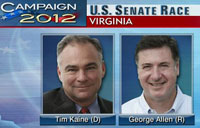 Two former governors of Virginia are facing off in a close race for one of the state’s Senate seats. Polls show Kaine with a slight lead over Allen, in the range of one to six points.
Two former governors of Virginia are facing off in a close race for one of the state’s Senate seats. Polls show Kaine with a slight lead over Allen, in the range of one to six points.
Allen, who also served in the Senate from 2000 to 2006, looks to regain the seat he lost to Webb. He was governor of the state from 1994 to 1998. Kaine served one term as Virginia’s chief executive, from 2006 to 2010, and as chairman of the Democratic National Committee from 2009 to 2011.
Allen’s plan includes reducing the corporate tax rate by 15 percent, a balanced budget constitutional amendment and allowing more domestic energy production. Kaine wants to increase investments in education, expand global trade markets and make sure taxes and regulations are “business friendly.”
Copyright 2012 Raycom News Network (RNN). All rights reserved. Reprinted here for educational purposes only. May not be reproduced on other websites without permission from WSFA.com, a Raycom Media Station. Visit the website at wsfa.com.
Questions
1. How is the Senate currently divided (by party)?
2. How many of the 100 Senate seats are up for election on November 6?
3. For how many of the Senate seats is the race too close to call?
4. What is a supermajority and how does it help a party to have a supermajority?
5. What is significant about holding a majority in the Senate? (What is the majority party able to do?)
6. From the article: what does each candidate want to do if elected? (Keep in mind that this article only provides a brief explanation of the position of a candidate on one issue. You need to visit candidates’ websites for a full picture of what he/she proposes to do if elected.)
CHALLENGE:
List 4 other Senate races which are too close to call. (Note: some reports list 11 close Senate races)
7. a) Are there any Senate races are taking place in your state? If so, name the candidates and their party affiliation. If not, name your senators and their party affiliation.
b) Visit the website of the candidates in your state. Read about their position on the issues. With which candidate do you agree? Explain your answer.
Resources
Polls for 2012 Senate races: realclearpolitics.com
Daily “Answers” emails are provided for Daily News Articles, Tuesday’s World Events and Friday’s News Quiz.



